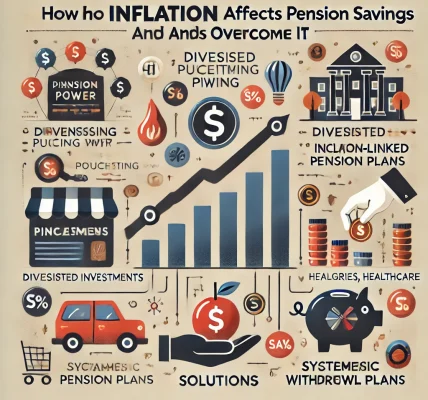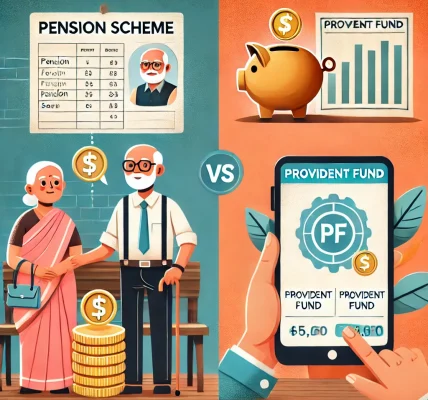Introduction
Planning for retirement is essential to ensure financial security and stability in your later years. One of the biggest decisions you will face is choosing between a government pension scheme and a private pension scheme. Both options come with their own advantages and drawbacks, and selecting the right one depends on your financial goals, risk appetite, and long-term needs.
In this blog, we will explore the key differences between government and private pension schemes, their benefits, and how to choose the best plan for your future.
What Are Pension Schemes?
A pension scheme is a financial plan that allows individuals to save for their retirement through regular contributions. Upon retirement, these savings provide financial support in the form of a pension or annuity.
Pension schemes are broadly categorized into two types:
- Government Pension Schemes – Managed and regulated by the government.
- Private Pension Schemes – Offered by private financial institutions and insurance companies.
Each of these schemes has unique features, eligibility criteria, and benefits, making it essential to understand their differences before making a choice.
Government Pension Schemes
Government pension schemes are typically designed to provide financial security to citizens, especially employees in the public and unorganized sectors. These schemes are backed by the government, ensuring stability and reliability.
Popular Government Pension Schemes in India
- National Pension System (NPS) – A voluntary pension scheme open to all citizens.
- Employees’ Provident Fund (EPF) & Employees’ Pension Scheme (EPS) – For salaried employees in the organized sector.
- Atal Pension Yojana (APY) – For workers in the unorganized sector with guaranteed pension benefits.
- Indira Gandhi National Old Age Pension Scheme (IGNOAPS) – Provides financial assistance to elderly individuals from low-income groups.
Advantages of Government Pension Schemes
✅ Government-Backed Security – Low risk, as funds are managed by the government. ✅ Guaranteed Returns – Some schemes, like APY, offer assured pension benefits. ✅ Tax Benefits – Contributions to schemes like NPS and EPF are eligible for tax deductions. ✅ Low Management Fees – NPS has one of the lowest fund management fees compared to private options.
Disadvantages of Government Pension Schemes
❌ Lower Returns – Generally offer lower returns compared to private pension plans. ❌ Limited Flexibility – Withdrawal options and investment choices are restricted. ❌ Long Lock-in Period – Many government pension schemes require long-term contributions.
Private Pension Schemes
Private pension schemes are offered by financial institutions, insurance companies, and mutual fund houses. These schemes are market-driven and provide greater flexibility in terms of investment options and returns.
Popular Private Pension Schemes in India
- Unit-Linked Pension Plans (ULPPs) – Market-linked investment plans with a mix of equity and debt.
- Traditional Pension Plans – Offer fixed annuities and insurance benefits.
- Annuity Plans from Private Insurers – Provide lifelong or fixed-period pension payouts.
Advantages of Private Pension Schemes
✅ Higher Returns – Market-linked plans can offer higher growth potential. ✅ More Investment Options – Investors can choose between equity, debt, and balanced funds. ✅ Flexibility – Easier withdrawals, fund switching, and annuity options. ✅ Customization – Plans can be tailored to individual risk appetites and financial goals.
Disadvantages of Private Pension Schemes
❌ Higher Risk – Returns are subject to market fluctuations. ❌ Higher Costs – Management and administrative fees can be higher than government schemes. ❌ No Guaranteed Returns – Unlike government-backed schemes, private pension plans do not offer fixed pension benefits.
Comparison: Government vs. Private Pension Schemes
| Feature | Government Pension Schemes | Private Pension Schemes |
|---|---|---|
| Security | High (Government-backed) | Moderate to High (Depends on provider) |
| Returns | Low to Moderate | Moderate to High (Market-driven) |
| Tax Benefits | Available (EPF, NPS, APY) | Available (ULPPs, Annuity Plans) |
| Investment Flexibility | Limited | High |
| Risk Level | Low | Moderate to High |
| Management Fees | Low | High |
| Payout Type | Mostly fixed | Fixed or market-linked |
Which Pension Scheme is Right for You?
The right pension scheme depends on your financial situation, risk appetite, and retirement goals. Consider the following factors when making your decision:
Choose Government Pension Schemes If:
✔️ You want low-risk and stable returns. ✔️ You prefer government-backed security. ✔️ You are looking for long-term investment options with tax benefits. ✔️ You belong to the unorganized sector and need a guaranteed pension (e.g., APY).
Choose Private Pension Schemes If:
✔️ You are comfortable with market-linked risks for potentially higher returns. ✔️ You want greater flexibility in investment choices and withdrawals. ✔️ You are looking for customizable plans that match your retirement goals. ✔️ You are already investing in government schemes and want to diversify your portfolio.
Conclusion
Both government and private pension schemes have their pros and cons. If you prioritize security and guaranteed income, government pension schemes may be the best choice. On the other hand, if you seek higher returns and investment flexibility, private pension schemes could be a better fit.
The best approach is to diversify your retirement portfolio by investing in both government and private pension plans. This strategy ensures stability while also allowing for potential growth in your retirement savings.
Before making a decision, thoroughly research different pension schemes, compare their features, and assess your financial goals. Seeking advice from a financial expert can also help in making an informed choice.




